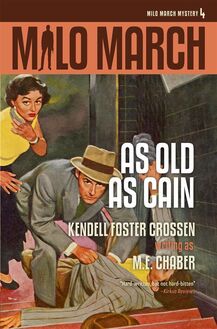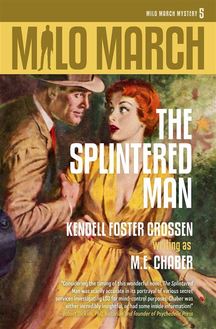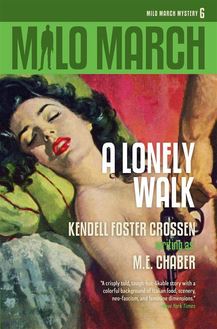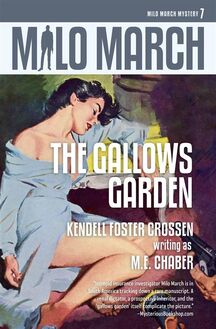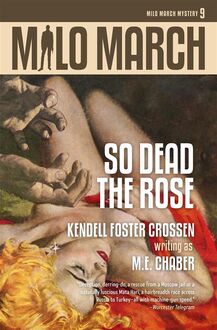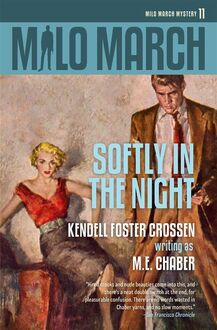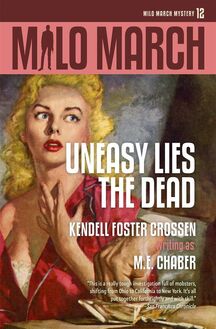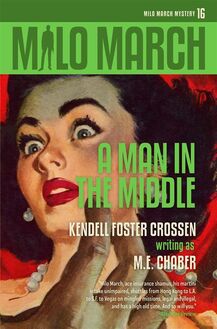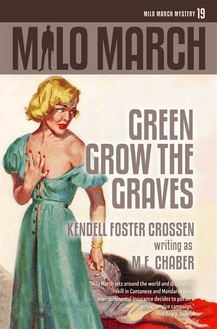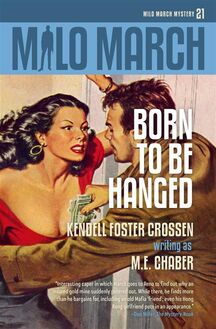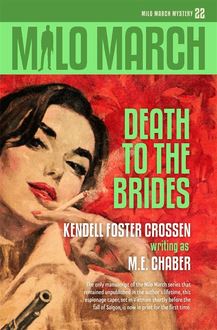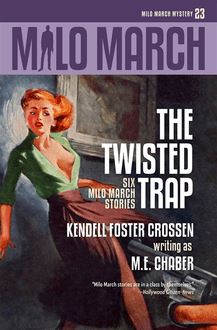Milo March #7 , livre ebook
115
pages
English
Ebooks
2020
Vous pourrez modifier la taille du texte de cet ouvrage
Obtenez un accès à la bibliothèque pour le consulter en ligne En savoir plus
Découvre YouScribe et accède à tout notre catalogue !
Découvre YouScribe et accède à tout notre catalogue !
115
pages
English
Ebooks
2020
Vous pourrez modifier la taille du texte de cet ouvrage
Obtenez un accès à la bibliothèque pour le consulter en ligne En savoir plus
Publié par
Date de parution
09 août 2020
Nombre de lectures
4
EAN13
9788835875710
Langue
English
Poids de l'ouvrage
3 Mo
Milo’s assignment is just to get the valuable manuscript back for the insurance company. But he also wants to investigate whether the deaths of two men were murders engineered by the regime. He also wonders what had happened to the large sum that the professor withdrew from a charitable fund for Monican refugees the same day he vanished. It would be great to deliver the regime’s chief assassin into the hands of the New York police. Not to mention that Milo has to figure out how to smuggle the manuscript out of the presidential palace. Oh, and what happened to the professor?
There was no problem getting into the Monican Republic; it’s getting out with all of this that might cause some trouble for Milo. And then there’s the small difficulty of two Latina beauties who may have been set up to trap him…
From the moment Milo lands in Torcido’s island, he is marked for murder. The finger man is an international playboy, and the executioner is a sinister mystery man called El Nariz—“The Nose.” The bait is a dark-haired Latin beauty with her own brand of Caribbean allure. It could be a lovely way to die… if only the sadistic Monican police chief doesn’t finish Milo off before he can fully enjoy the perks of the job.
Publié par
Date de parution
09 août 2020
EAN13
9788835875710
Langue
English
Poids de l'ouvrage
3 Mo
The Gallows Garden
by
Kendell Foster Crossen
Writing as M.E. Chaber
With a Afterword by Kendra Crossen Burroughs
Steeger Books / 2020
Copyright Information
Published by Steeger Books
Visit steegerbooks.com for more books like this.
©1986, 2020 by Kendra Crossen Burroughs
The unabridged novel has been lightly edited by Kendra Crossen Burroughs.
All rights reserved. No part of this book may be reproduced or utilized in any form or by any means, electronic or mechanical, without permission in writing from the publisher. The scanning, uploading, and distribution of this book via the Internet or via any other means without the permission of the publisher is illegal and punishable by law.
Publishing History
Hardcover
New York: Rinehart & Company, January 1958.
Toronto: Clarke, Irwin & Company, 1958.
London: T. V. Boardman (American Bloodhound Mystery #225), August 1958. Dust jacket by Denis McLoughlin.
Paperback
New York: Pocket Books #1240, as The Lady Came to Kill, May 1959. Cover by Len Goldberg.
New York: Paperback Library (63-549), A Milo March Mystery, #18, March 1971. Cover by Robert McGinnis.
Dedication
To Lisa Palmieri, with love, and in memory of the season “when grape leaves curl up like the hands of little dying grandmothers.”
One
My name is Milo March. I’m an insurance investigator. It’s not quite the same as being a private eye, even though I wear a trench coat, sometimes play a case by ear, and have been known to chase a blonde—when there wasn’t a brunette around.
I have my own office on Madison Avenue—the martini capital of the United States. March’s Insurance Service Corporation. I work for any of the insurance companies that wants to hire me. It means that I get most of the cases—life, fire, jewelry, or other valuables—which are too big or too hard for their regular claims departments. It’s a living.
It had been three or four weeks since I’d been on a case and my bank roll was beginning to look as if it had taken a course at Slenderella. My fees were pretty high but the money didn’t last long after I got through paying for my apartment and my office and supporting five or six of the leading bartenders in New York. I was trying to think of a way of drumming up a little business when the phone rang.
I picked up the receiver. “March’s Insurance Service Corporation,” I said in a voice which I hoped would convey the idea that I was so busy I could barely squeeze in one more case.
“Milo,” a sexy contralto voice said, “have you really become as stuffy as you sound?”
I recognized the voice. It belonged to Merry Mellany. She was beautiful and blond and either the third or the fourth richest woman in the world. I could never remember which. I had worked on a case involving her jewels a couple of years earlier and we’d been friends ever since. And I mean just friends. It had just missed developing into something else several times. Sometimes I suspected the only reason it hadn’t was that the thought of all that money scared me.
“I am not stuffy,” I said indignantly. “But once in a while I have to sound as if this were an office and not an after-hours club. How are you, Merry?”
“Wonderful, but bored,” she said. “Take me to lunch?”
“It’s the best offer I’ve had all morning,” I said. “Twelve-thirty at Cherio’s?”
“Love you,” she said. “I’ll be there.” She hung up.
I replaced the receiver, wondering why it always seemed so much easier to spend money than to make it. That seemed to be the only result of a hard money policy.
I had no sooner put the receiver down than the phone rang again. I picked it up and said, “Yeah?” I was back to normalcy.
“Milo?” It was a man’s voice. It sounded like someone I knew.
“Yeah,” I said again. It was a good line and I might as well stick with it until I got close enough to read the score.
“This is Martin Raymond,” he said. I knew him, all right. He was a vice-president of Intercontinental Insurance, a company I’d done a lot of work for. “Got a minute?”
“I did a while ago,” I said, “so it must be around here somewhere.”
He rewarded me with a conference-room laugh. “That’s my boy,” he said. “Always making with the old boffola. Want to run over here? We have a problem maybe you and I can kick into shape.”
“Let’s just run it up a flagpole and see who salutes it,” I said. “I’ll be right over.”
I hung up and looked at my watch. It was eleven o’clock. I called my answering service and told them I wouldn’t be back until after two. Then I went out and walked up Madison Avenue.
Intercontinental had been one of the first insurance companies to move uptown. They had their own building on upper Madison. It was an imposing edifice of glass and steel, giving mute testimony to the profits in premiums. Up on Raymond’s floor there was a redheaded receptionist who gave ample proof that they didn’t think only of money. She checked on her phone and told me I could go in.
Raymond’s office, on the other hand, was a triumph of cash over taste. Only slightly smaller than Grand Central Station, it was furnished in Early American, including a refurbished and glorified cobbler’s bench that now held only a couple of ashtrays. The walls were covered with photographs of the early executives of Intercontinental, all of them looking like bandits who had come down out of the hills in their Sunday finery to have their pictures taken. Raymond was sitting behind a low table-desk, the top of which was bare except for a gold pencil and pad. The clean-desk bit was fashionable on Madison Avenue and was supposed to hint that here was a man so busy that he kept up with his work.
“Milo, boy, it’s good to see you,” he said as I came in. He waved a hand toward something that had once been an Early American cupboard and was now a bar. “I guess it’s too early to offer you a drink.”
“It’s never too early,” I said, “but I’ll bear up without one. Somebody has to show those A.A.’s they’re not the only ones who can keep a grip on themselves.”
He laughed politely. “Want to go to work?”
“I never want to,” I said, “but I like the money. It comes in handy when I want to add to my stamp collection. What’s the job?”
“Just a small problem,” he said. Which meant it was a tough one. “The name Dr. Jaime Moreno do anything to you?”
“Not especially,” I admitted. “It’s vaguely familiar, but that’s all.”
“He was a professor here at New York University. Vanished not long ago.”
Then I remembered. Dr. Jaime Moreno had been a political refugee from one of the Latin American countries in the Caribbean. He’d been teaching Latin American literature at the university. He had left the university one evening and that was the last ever seen of him.
“I remember,” I said. “He came from one of those banana republics in Central America.”
“Sugar, not bananas,” Raymond said. “He was an exile from the Monican Republic, or Republic of Santa Monica. He was pretty well known as a critic of the regime down there.”
I was remembering more and that was putting it mildly. The Monican Republic was the personal property of a guy who called himself Generalissimo Francisco Torcido, or sometimes simply The Benefactor. He’d been the dictator of the country for the past thirty years, and according to all reports it had been one of the bloodiest rules in the world. The Monican Republic was a little country about the size of Illinois, bounded by the Dominican Republic, the Republic of Haiti, and the Caribbean.
“I remember reading about it in the papers,” I said. “They never found him, huh?”
Raymond shook his head. “Not a trace.”
“The theory,” I said, “was that Torcido had him killed, wasn’t it?”
“There are two theories,” Raymond said carefully. “Moreno was the treasurer of some refugee fund amounting to about one hundred and thirty thousand dollars. The day after he ‘vanished,’ he showed up at the bank and drew all of the money out. That was the last time he was seen. So one theory is that he took the money and went to greener pastures. The other theory is that Generalissimo Torcido had him kidnapped and brought back down there, where he was killed. There is also the death of an American which some people are trying to tie in with it.”
I remembered reading something about that. It had to do with an American pilot who had supposedly flown Moreno to the Monican Republic and then he, too, had vanished there. But I didn’t ask any questions. I could always check it with someone who wasn’t so careful as Raymond.
“After all,” Raymond added irrelevantly, “the Monican Republic, while small, is an important member of the anti-Communist bloc, and Generalissimo Torcido is, I believe, well liked in Washington.”
“Sure,” I said, “and I remember hearing somewhere that Lucky Luciano helped us to win the war. Bedfellows make
